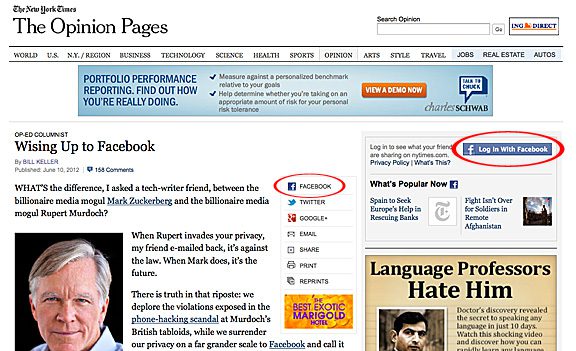Bill Keller, op-ed columnist for and former executive editor of The New York Times, has written an intriguing piece about Facebook: “Wising Up to Facebook.” The title reveals the tone of the column: leaning toward critical, but not altogether negative. Keller begins with a predictable blast against Facebook’s approach to privacy (or the lack thereof):
WHAT’S the difference, I asked a tech-writer friend, between the billionaire media mogul Mark Zuckerberg and the billionaire media mogul Rupert Murdoch?
When Rupert invades your privacy, my friend e-mailed back, it’s against the law. When Mark does, it’s the future.
There is truth in that riposte: we deplore the violations exposed in the phone-hacking scandal at Murdoch’s British tabloids, while we surrender our privacy on a far grander scale to Facebook and call it “community.” Our love of Facebook has been a submissive love.
Those who have invested their lives in passive print media never seem to like the interactive elements of social media, including the ability for advertising to be tapered to the preferences of the individual. Personally, I don’t mind that the ads on my computer screen actually interest me, whereas ads in newspapers rarely do.
Keller goes on to lay out the woes of Facebook, including the fact that it underperformed in its recent stock offering. But, just when I was ready to write of Keller as one who has jumped prematurely on the anti-Facebook bandwagon, he steps back from the brink.
We should be as suspicious of the Facebook-is-over hype as of the original euphoria. Lee Rainie, who studies Internet culture at the Pew Research Center, said that polling does not reflect a significant Facebook backlash so far; the empire is still growing toward a billion users, and more and more people say they use it every day. What has changed is that users say they are more wary of posting private information — especially when contemplating a job hunt, a college application or a budding romance. And many Facebook users — a third, according to a new Reuters/Ipsos poll — are cutting back the time they spend there.
“The infatuation phase is morphing into a more mature phase,” Rainie told me.
Jonathan Zittrain of Harvard’s Berkman Center for Internet and Society adds that this reckoning is mutual, and natural, as Facebook grows from a plaything born in a college dorm room into a very serious enterprise. “Even Facebook has to lose its own romantic vision of itself,” he said.
Yes, indeed. We’ve been through this before, haven’t we? About a decade ago, everybody was sure that blogging was going to change the world. Everyone would have a blog and everything would be different because of it. Well, tens of millions of people started blogging and most of them stopped in about two weeks. Blogging turned out to have genuine value (social, economic, political, etc.). But it also didn’t measure up to the hype.
The same will be true of Facebook, though its current impact seems far more extensive than blogging. Who knows if Facebook per se will thrive or even survive? I’m old enough to remember when AOL was going to rule the world. But I have no doubt that social media à la Facebook, Twitter, etc. will continue to grow in importance throughout the world after the hype and the anti-hype have passed.












